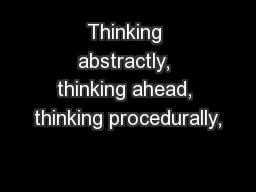PPT-Thinking Sociologically about LFI
Author : jane-oiler | Published Date : 2016-07-16
Professor Sue Scott Universities of Edinburgh and York Outline Introduction Social Construction and why there is no such thing as an accident Wisdom after the event
Presentation Embed Code
Download Presentation
Download Presentation The PPT/PDF document "Thinking Sociologically about LFI" is the property of its rightful owner. Permission is granted to download and print the materials on this website for personal, non-commercial use only, and to display it on your personal computer provided you do not modify the materials and that you retain all copyright notices contained in the materials. By downloading content from our website, you accept the terms of this agreement.
Thinking Sociologically about LFI: Transcript
Download Rules Of Document
"Thinking Sociologically about LFI"The content belongs to its owner. You may download and print it for personal use, without modification, and keep all copyright notices. By downloading, you agree to these terms.
Related Documents














